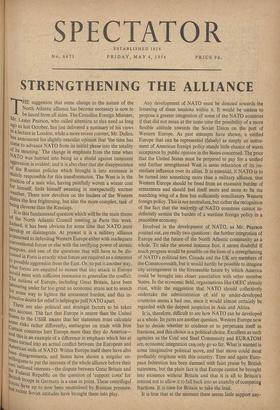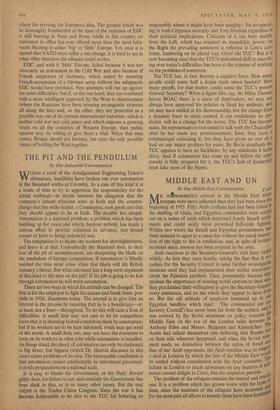STRENGTHENING THE ALLIANCE
IFHE suggestion that some change in the nature of the North Atlantic alliance has become necessary is now to be heard from all sides. The Canadian Foreign Minister, Mr. Lester Pearson, who called attention to this need as long ago as last October, has just delivered a summary of his views hi a lecture in London, while a more recent convert, Mr. Dulles, has announced his slightly oracular opinion that 'the time has Come to advance NATO from its initial phase into the totality of its meaning.' The change in emphasis from the time when NATO was hurried into being as a shield against imminent aggression is evident; and it is also clear that the disappearance of the Russian policies which brought it into existence is mainly responsible for this transformation. The West is in the Position of a man who, having painfully woven a winter coat for himself, finds himself sweating in unexpectedly warmer weather. There now devolves on the leaders of the Western States the less frightening, but also the more complex, task of being cleverer than the Russiags. It is this fundamental question which will be the main theme el the North Atlantic Council meeting in Paris this week. Indeed, it has been obvious for some time that NATO must develop or disintegrate. At present it is a military alliance committed to defending Western Europe either with inadequate conventional forces or else with the terrifying power of atomic Weapons, and one of the questions that will have to be dis- cussed in Paris is exactly what forces are required as a deterrent t0 Possible aggression from the East. Or, to put it another way, 'illat forces are required to ensure that any attack in Europe The meet with sufficient resistance to generalise the conflict. he nations of Europe, including Great Britain, have been labouring under far too great an economic strain not to search ,c).r some way to lighten the armament burden, and this in- stinctive desire for relief is helping.to pull NATO apart. . There are also political and strategic factors to be taken Into account. Th'e fact that .Europe is nearer than the United ,."'tates to the USSR means that her statesmen must calculate f me risks rather differently; embargoes on trade with Iron curtain countries hurt Europe more than they do America- and this is an example of a difference in emphasis which has at 'Alines turned into an actual conflict between the European and American ends of NATO. Within Europe itself there have also weir? disagreements, and States have shown a singular un- willingness to put the interests of the whole alliance before their 417 national interests—the dispute between Great Britain and A t.e., Federal Republic on the question of 'support costs' for forltish troops in Germany is a case in point. These centrifugal i bu have up to now been neutralised by Russian pressure, recent Soviet attitudes have brought them into play. Any development of NATO must be directed towards the lessening of these tensions within it. It would be useless to propose a greater integration of some of the NATO countries if that did not mean at the same time the possibility of a more flexible attitude towards the Soviet Union on the part of Western Europe. As past attempts have shown, a unified Europe that can be represented (falsely) as simply an instru- ment of American foreign policy stands little chance of warm acceptance by public opinion in the States concerned. The price that the United States must be prepared to pay for a unified and further strengthened West is some relaxation of its im- mediate influence over its allies. It is essential, if NATO is to be turned into something more than a military alliance, that Western Europe should be freed from an excessive burden of armaments and should feel itself more and more to be the marching wing of a firm but sufficiently conciliatory Western foreign policy. This is not neutralism, but rather the recognition of the fact that the majority of NATO countries cannot in- definitely sustain the burden of a wartime foreign policy in a peacetime economy.
Involved in the development of NATO, as Mr. Pearson pointed out, are really two questions : the further integration of Europe and the future of the North Atlantic community as a whole. To take the second instance first, it seems doubtful if much progress would be possible on the lines of a strengthening of NATO's political ties. Canada and the UK are members of the Commonwealth, but it would hardly be possible to imagine any arrangement in the foreseeable future by which America could be brought into closer association with other member States. In the economic field, organisations like OEEC already exist, while the ,suggestion that NATO should collectively undertake the administration of aid to under-developed countries seems a bad one, since it would almost certainly be regarded with the deepest suspicion in Asia and Africa.
It is, therefore, difficult to see how NATO can be developed as a whole. Its parts are another question. Western Europe now has to decide whether to coalesce or to perpetuate itself in fractions, and this choice is a political choice. Excellent as such agencies as the Coal and Steel Community and EURATOM are, economic integration call only go so far. What is wanted is some imaginative political move, and that move could most profitably originate with this country. Time and again Euro- pean federation has been damned with faint praise by British statesmen, but the plain fact is that Europe cannot be brought into existence without Britain and that it is all to Britain's interest not to allow it to fall back into an anarchy of competing fractions. It is time for Britain to.take the lead.
It is true that at the moment there seems little support any- where for reviving the European idea. The ground which was so thoroughly bombarded at the time of the rejection of EDC is still burning in Paris and Bonn, while in this country no statesman in office has ever offered more than the most luke- warm blessing to either 'big' or 'little' Europe. Yet, once it is agreed that NATO must suffer a sea-change, it is hard to see in what other direction the alliance could evolve.
EDC, and with it 'little' Europe, failed because it was too obviously an instrument in the Cold War and also because of French suspicions of Germany, which ended by ensuring French acceptance of a German army without the safeguards EDC would have provided. New attempts will run up against the same difficulties; but if, on the one hand, they are combined with a more intelligent approach by the West to disarmament (where the Russians have been winning propaganda victories all along the line) and, on the other, they are presented as a possible way out of the present international stalemate, which is neither cold war nor cold, peace and which imposes a growing strain on all the countries of Western Europe, then public opinion may be willing to give them a trial. When that time comes, Britain should not hesitate, but seize the only possible means of holding the West together.











































 Previous page
Previous page